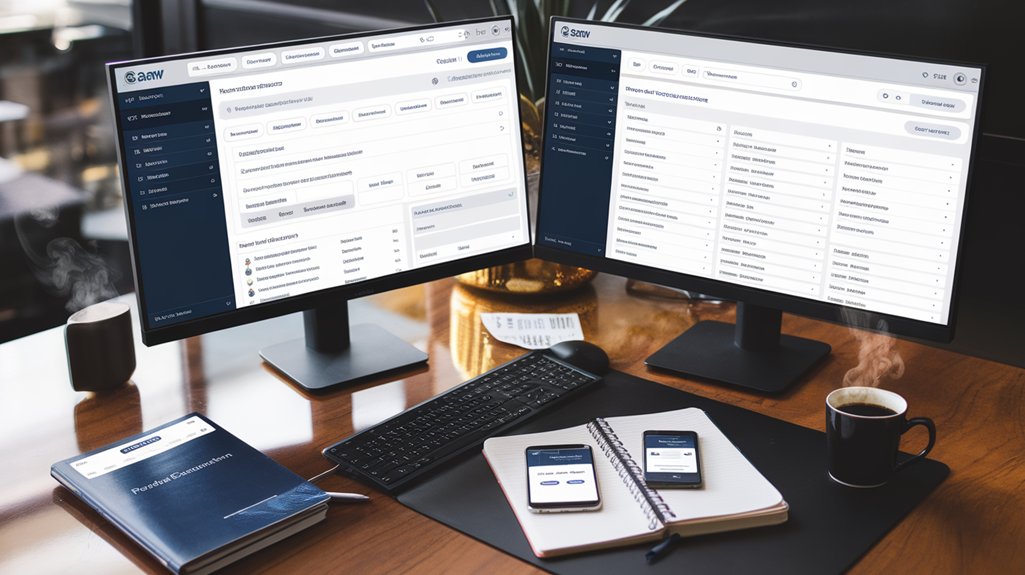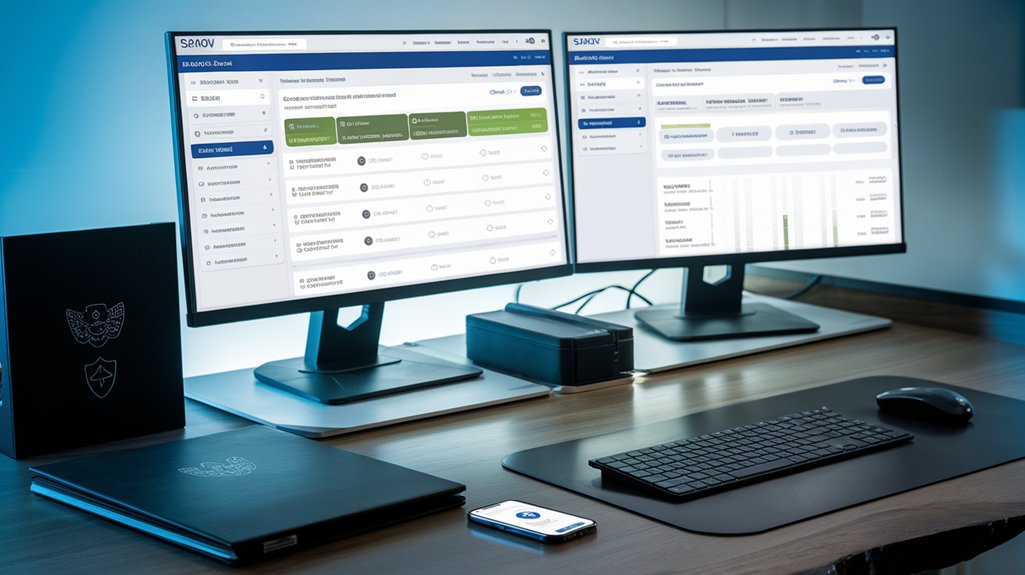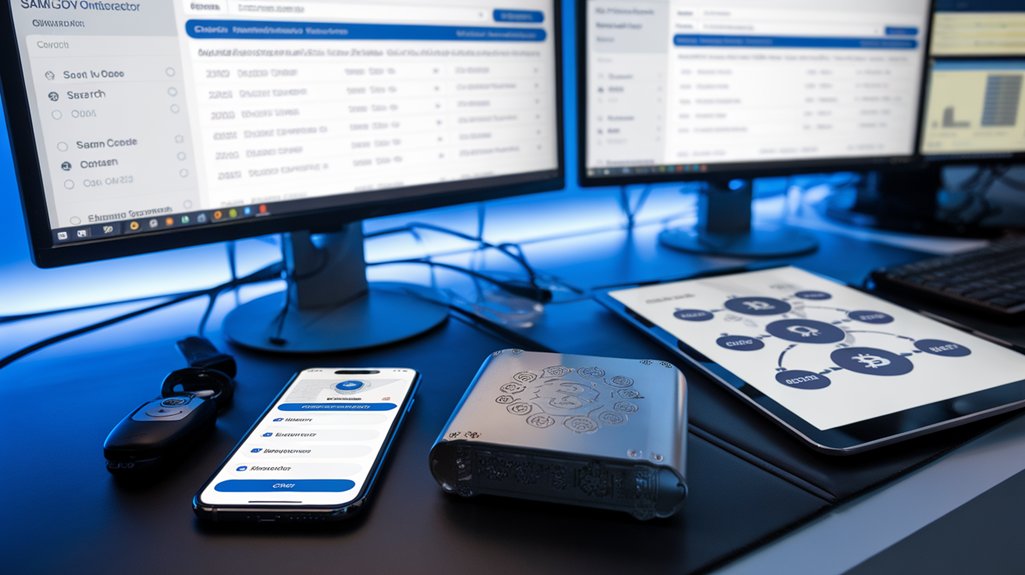DLA’s CAGE Public search tool offers the most reliable verification for entity codes without requiring login credentials. Supplementary options include Free CAGE Code Search and SAM.gov’s integrated lookup functionality. Government contractors should implement quarterly verification protocols to maintain alignment between SAM profiles and DLA records. For international entities, NATO Commercial and Government Entity (NCAGE) resources provide specialized support through Export.gov connections. Proper utilization of these tools prevents contract eligibility issues and streamlines compliance requirements.
Table of Contents
ToggleEssential CAGE Code Lookup Tools for Federal Contractors

When traversing the federal contracting landscape, government vendors must utilize reliable CAGE Code lookup tools to maintain compliance and guarantee successful registration in procurement systems.
DLA’s CAGE Public (CSI) serves as the primary resource for verifying domestic and international entity codes, highlighting CAGE code importance in federal procurement processes.
Contractors benefit from multiple verification options. The official DLA platform provides unified search capabilities by entity name, code, or location filters, while third-party portals like Free CAGE Code Search offer alternatives without SAM.gov login requirements.
Government contractors can verify CAGE codes through official DLA portals or alternative third-party platforms providing streamlined access to essential procurement data.
These resources enhance CAGE code accessibility for businesses of all sizes. Companies seeking to do business with the U.S. Government must register at SAM to receive a CAGE Code.
For international entities, the system includes integration with NCAGE forms, supporting NATO-oriented contractors through Export.gov connections—a critical feature for companies pursuing global defense opportunities. The DLA website offers instructional videos with multilingual support to guide entities through the NCAGE Code acquisition process.
Obtaining this unique identifier is a crucial step for organizations including corporations, non-profits, and educational institutions aiming to secure government contracts or grants.
CAGE Code Update and Verification Best Practices

Every federal contractor must establish rigorous verification protocols to maintain accurate CAGE Code information within the SAM.gov system. Organizations should implement quarterly CAGE code audits to guarantee alignment between their SAM profile and DLA records, preventing potential contract disruptions.
When updating business information, contractors must modify their SAM registration within 30 days of any legal name or address changes. Regular verification through both SAM.gov and the DLA search portal (https://cage.dla.mil) helps identify CAGE code discrepancies before they impact contract eligibility. Businesses must first obtain a DUNS number before applying for their CAGE code registration. Remember that physical address validation is essential as PO boxes and virtual locations are not accepted for CAGE code registration. The System for Award Management serves as the primary database for tracking company performance and regulatory compliance with government contracts.
Document retention plays a critical role in compliance, requiring businesses to maintain legal documents, address verification, and correspondence regarding CAGE status changes.
Implementing a dual-verification process for critical field updates guarantees data integrity and simplifies future audits or contracting officer reviews.
Common Troubleshooting Solutions for CAGE Code Management

Steering CAGE code challenges requires systematic approaches to resolve common validation issues that federal contractors encounter.
When facing CAGE code discrepancies, contractors should first verify that their legal business name and Tax Identification Number match IRS records exactly, as this represents the most frequent validation error.
For duplicate address conflicts, contacting the DLA CAGE office at 877-352-2255 provides the most direct resolution path.
Entity type validation errors often stem from incorrect classification during registration, particularly for sole proprietorships.
Foreign entities experiencing validation errors should confirm their NCAGE code was secured before attempting SAM registration.
For system synchronization issues, allow 24-72 hours for updates to propagate across platforms.
Most validation errors can be preemptively identified using SAM.gov’s “Validate CAGE” function before final submission.
Maintaining an active registration on SAM.gov is critical as it ensures your CAGE Code remains valid for government contracting opportunities.
Remember that CAGE Codes are required for all entities looking to sell products or services to the federal government.
Frequently Asked Questions
Can Entities Have Multiple CAGE Codes for Different Facility Locations?
Yes, entities can receive multiple CAGE code assignments for different facility locations. Each distinct operational site or business unit within an organization can maintain its own unique CAGE code for identification purposes.
How Do International Companies Transition From NCAGE to Regular CAGE Codes?
International companies shift from NCAGE to CAGE codes by establishing a U.S. presence, typically through a subsidiary. This CAGE code shift requires registering the U.S. address with SAM.gov and contacting DLA if necessary.
What Happens if My CAGE Code Becomes Inactive During Contract Performance?
Inactive CAGE codes during contract performance result in contract compliance violations, potential payment delays, and security requirement breaches. Contractors must pursue code reactivation through appropriate channels to avoid termination risk or subcontractor disruptions.
Are CAGE Codes Permanently Assigned or Do They Expire?
CAGE codes are not permanently assigned. U.S. entity CAGE code assignments issued after August 26, 2016 require renewal every five years. Without proper CAGE code renewals, the code will expire and become inactive.
Can Tribal Entities Use Special Designations With Their CAGE Codes?
Tribal entities don’t receive special tribal designations with their CAGE codes. These codes are assigned uniformly across all business types based on entity name and location, regardless of tribal status in government CAGE code usage.